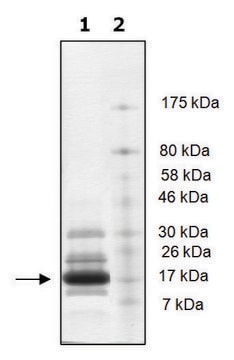SRP2071
Androgen receptor (650-920), human
recombinant, expressed in E. coli, ≥70% (SDS-PAGE)
Synonym(s):
AIS, DHTR, HUMARA, HYSP1, KD, NR3C4, SBMA, SMAX1, TFM
Sign Into View Organizational & Contract Pricing
All Photos(1)
About This Item
UNSPSC Code:
12352202
NACRES:
NA.26
Recommended Products
biological source
human
recombinant
expressed in E. coli
Assay
≥70% (SDS-PAGE)
form
frozen liquid
mol wt
~33.7 kDa
packaging
pkg of 10 μg
storage condition
avoid repeated freeze/thaw cycles
concentration
300 μg/mL
color
clear
colorless
NCBI accession no.
UniProt accession no.
shipped in
dry ice
storage temp.
−70°C
Gene Information
human ... AR(367)
Biochem/physiol Actions
The androgen receptor is an androgen-activated member of the nuclear receptor superfamily of transcription factors. Signaling by the androgen receptor plays a key role in proper development and function of male reproductive organs. The androgen receptor gene is more than 90 kb long and codes for a protein that has 3 major functional domains: the N-terminal domain, DNA-binding domain, and androgen-binding domain. The protein functions as a steroid-hormone activated transcription factor. Upon binding the hormone ligand, the receptor dissociates from accessory proteins, translocates into the nucleus, dimerizes, and then stimulates transcription of androgen responsive genes. This gene contains 2 polymorphic trinucleotide repeat segments that encode polyglutamine and polyglycine tracts in the N-terminal transactivation domain of its protein. Expansion of the polyglutamine tract causes spinal bulbar muscular atrophy (Kennedy disease). Mutations in this gene are also associated with complete androgen insensitivity (CAIS). Two alternatively spliced variants encoding distinct isoforms have been described. The androgen receptor (AR) has been shown to play a critical role in the development and progression of prostate cancer.
Physical form
Clear and colorless frozen liquid solution
Preparation Note
Use a manual defrost freezer and avoid repeated freeze-thaw cycles. While working, please keep sample on ice.
Storage Class Code
10 - Combustible liquids
WGK
WGK 1
Flash Point(F)
Not applicable
Flash Point(C)
Not applicable
Choose from one of the most recent versions:
Certificates of Analysis (COA)
Lot/Batch Number
Don't see the Right Version?
If you require a particular version, you can look up a specific certificate by the Lot or Batch number.
Already Own This Product?
Find documentation for the products that you have recently purchased in the Document Library.
Shalini Murthy et al.
The Prostate, 64(4), 362-372 (2005-03-09)
1,25(OH)2D3 inhibits the growth of prostate cancer cells; previous reports suggest that 1,25(OH)2D3 actions in LNCaP prostate cancer cells are androgen dependent. This is due in part to the observation that the androgen receptor (AR) antagonist, Casodex, modestly inhibits LNCaP
Eric Metzger et al.
Nature, 437(7057), 436-439 (2005-08-05)
Gene regulation in eukaryotes requires the coordinate interaction of chromatin-modulating proteins with specific transcription factors such as the androgen receptor. Gene activation and repression is specifically regulated by histone methylation status at distinct lysine residues. Here we show that lysine-specific
Rute B Marques et al.
International journal of cancer, 117(2), 221-229 (2005-05-19)
To study the mechanisms whereby androgen-dependent tumors relapse in patients undergoing androgen blockade, we developed a novel progression model for prostate cancer. The PC346C cell line, established from a transurethral resection of a primary tumor, expresses wild-type (wt) androgen receptor
Our team of scientists has experience in all areas of research including Life Science, Material Science, Chemical Synthesis, Chromatography, Analytical and many others.
Contact Technical Service








